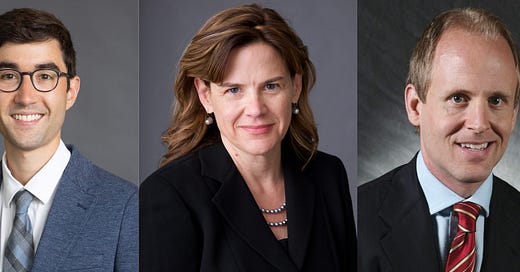Kevin Tobia (Georgetown University), Brian Slocum (University of the Pacific) and Victoria Nourse (Georgetown), “Progressive Textualism”
Georgetown Law Journal, 2022
Tobia, Kevin, Slocum, Brian, and Nourse, Victoria. 2022. “Progressive Textualism.” Georgetown Law Journal 110): 1437-1493.
By Kevin Tobia, Brian Slocum, and Victoria Nourse
In American legal interpretation, the lingua franca is textualism. As Supreme Court Justice Elena Kagan famously put it: “We’re all textualists now.” Today’s courts seek to interpret statutes and the Constitution in line with the law’s public meaning, what the text communicates to an ordinary reader. This approach is often associated with conservative policy outcomes (think D.C. v. Heller, concerning the 2nd Amendment).
In our article, we argue that language is not inherently politically conservative, and so neither should be textualism. Given the Court’s textualist commitments, this is a unique time for experts on language—including philosophers, linguists, and empiricists—to explain how to accomplish a more sophisticated textualism. We call that approach (methodologically) “progressive textualism.”
We are not the first to suggest that liberal lawyers adopt a form of “progressive textualism.” Others have proposed a related idea: Progressive lawyers should strategically adopt textualism to achieve socially liberal or progressive results. Our article considers an alternative form of progressive textualism. Rather than starting with the desired outcome (e.g. a conservative or liberal result), we propose that textualists adopt a methodologically progressive textualism.
What is “methodologically progressive textualism”? For one, it requires textualists to replace speculation about language with empirical evidence. Today’s textualists often appeal to how the “ordinary reader” would understand the text. As Justice Barrett recently proposed, textualists “approach language from the perspective of an ordinary English speaker.” Textualists adopting this framework should not rely on “homey examples” about what they might say to their friend. As Eskridge and Nourse put it, “When Justices—elite lawyers—debate how “ordinary people” talk, there is a serious risk that their renderings will speak with an upper-class, judicially-inflected accent.” Instead, judges should consult evidence about how people understand language.
Consulting this evidence should make textualists more cautious. Language contains vagueness and ambiguity, and when statutes turn on such language there is no single “ordinary reader” to be found. A law stating that “no vehicles may enter the park” clearly communicates that cars are prohibited. But as legal philosophers have long emphasized, it is not clear with respect to bicycles. What about canoes? Unsurprisingly ordinary people are divided about these questions. If the text is under-determinate, textualist judges should look elsewhere, such as evidence of the law’s purpose, the authors’ meaning, or its consequences.
A second example of progressive textualism concerns the dynamic nature of interpretation. Textualists rely on “linguistic” canons, rules that aim to reflect what texts communicate. For example, the “ejusdem generis” canon holds that catch-all terms that follow a list should be construed similarly to items in the list. For example, in the rule, “No cars, trucks, and other vehicles may enter the park,” the catch-all term “other vehicles” should be construed to cover buses (similar to cars and trucks) but not wheelchairs (not similar to cars and trucks).
Textualists should employ whatever linguistic canons accurately reflect ordinary language. But, we propose, not all of those canons have been recognized by textualists. For example, consider law’s traditional “gender canon.” This holds that masculine terms (e.g., “his”) include the feminine (e.g., “her”). In an empirical study, we found that people understand law in line with this canon. But people also understand law in line with other gender rules, such as “masculine terms include the non-binary”: Laws refereeing to “his” are generally understood to apply to men, women, and non-binary persons. This is not a traditional rule of interpretation, but a progressive textualist should recognize these new canons, insofar as they accurately reflect people’s understanding of legal language.
As a final example, consider the genre of legal language. Some modern textualists have greatly emphasized the ordinariness of the ordinary reader, consulting ordinary dictionaries, and even ordinary corpora (e.g., the Corpus of Historical American English). To interpret the law via the ordinary reader, it seems, judges should give terms their ordinary (non-technical) meanings. However, one of our recent empirical studies indicates that ordinary people do not understand law to be exhausted by ordinary meanings. Instead, laypeople understand law to regularly express technical meanings, especially technical legal meanings. As such, textualists who seek to do justice to ordinary people’s understanding of law should more often consult technical, legal authorities.
These three findings—ordinary people often disagree about language; they understand law in line with new canons; and they understand law as a partly technical language—are important inputs to a methodologically progressive textualism. Textualists who ignore realities about ordinary understanding of law are practicing a methodologically impoverished textualism, a “regressive textualism.”
Whether a judge should be a textualist represents a divisive normative debate. But in a world in which “we’re all textualists,” judges should at least do textualism well. We hope that future philosophical and empirical work illuminates other ways in which textualists should proceed to achieve their stated commitments.





